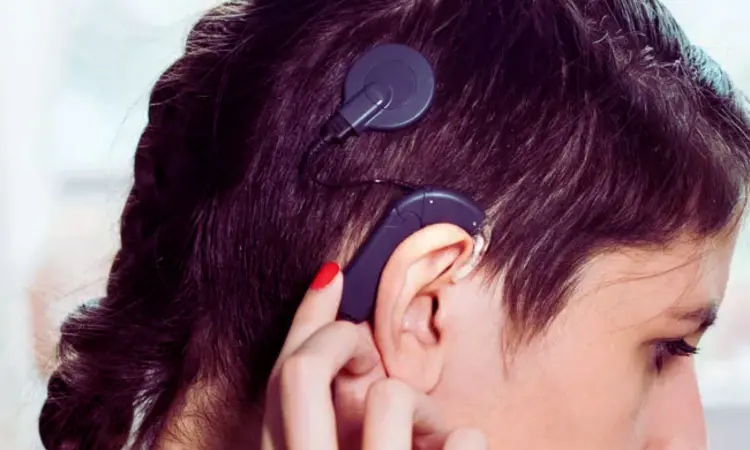- Home
- Medical news & Guidelines
- Anesthesiology
- Cardiology and CTVS
- Critical Care
- Dentistry
- Dermatology
- Diabetes and Endocrinology
- ENT
- Gastroenterology
- Medicine
- Nephrology
- Neurology
- Obstretics-Gynaecology
- Oncology
- Ophthalmology
- Orthopaedics
- Pediatrics-Neonatology
- Psychiatry
- Pulmonology
- Radiology
- Surgery
- Urology
- Laboratory Medicine
- Diet
- Nursing
- Paramedical
- Physiotherapy
- Health news
- Fact Check
- Bone Health Fact Check
- Brain Health Fact Check
- Cancer Related Fact Check
- Child Care Fact Check
- Dental and oral health fact check
- Diabetes and metabolic health fact check
- Diet and Nutrition Fact Check
- Eye and ENT Care Fact Check
- Fitness fact check
- Gut health fact check
- Heart health fact check
- Kidney health fact check
- Medical education fact check
- Men's health fact check
- Respiratory fact check
- Skin and hair care fact check
- Vaccine and Immunization fact check
- Women's health fact check
- AYUSH
- State News
- Andaman and Nicobar Islands
- Andhra Pradesh
- Arunachal Pradesh
- Assam
- Bihar
- Chandigarh
- Chattisgarh
- Dadra and Nagar Haveli
- Daman and Diu
- Delhi
- Goa
- Gujarat
- Haryana
- Himachal Pradesh
- Jammu & Kashmir
- Jharkhand
- Karnataka
- Kerala
- Ladakh
- Lakshadweep
- Madhya Pradesh
- Maharashtra
- Manipur
- Meghalaya
- Mizoram
- Nagaland
- Odisha
- Puducherry
- Punjab
- Rajasthan
- Sikkim
- Tamil Nadu
- Telangana
- Tripura
- Uttar Pradesh
- Uttrakhand
- West Bengal
- Medical Education
- Industry
Cochlear Implants most Effective Intervention for Speech Perception in Noise in Single-Sided Deafness: JAMA

Netherlands: A recent randomized clinical trial has demonstrated that cochlear implantation (CI) significantly improves speech perception in noise for patients with single-sided deafness (SSD), offering them a partial restoration of binaural hearing. The findings were published online in JAMA Otolaryngology-Head & Neck Surgery on January 16, 2025.
The study, which followed patients for 24 months, found that the CI group outperformed other treatment options, including bone-conduction devices (BCD), contralateral routing of signals hearing aids (CROS) systems, and no treatment in terms of speech recognition in challenging listening environments.
"After 24 months, patients with cochlear implants demonstrated significantly improved speech perception in noise and enhanced disease-specific quality of life, compared to those using bone conduction devices, contralateral routing of signals hearing aids, or receiving no treatment," the researchers reported.
Jan A. A. van Heteren, UMC Utrecht Brain Center, University Medical Center Utrecht, Utrecht, the Netherlands, and colleagues conducted the study to assess the impact of cochlear implants (CI), bone conduction devices, contralateral routing of signals hearing aids (CROS), and no treatment on speech perception in noise in patients with single-sided deafness.
For this purpose, the researchers conducted a single-center randomized clinical trial involving adult patients with single-sided deafness. Participants were divided into three groups: one receiving a cochlear implant, another undergoing a trial with a bone conduction device followed by CROS, and the third with CROS followed by BCD. After trial periods, patients chose between BCD, CROS, or no treatment. The study measured speech reception thresholds in noise and disease-specific quality of life (QOL) at baseline and 3, 6, 12, and 24 months.
Key Findings:
- One hundred and twenty patients participated, with 50.0% females and a mean age of 53.0 years. At the start of follow-up, 28 patients received a cochlear implant (CI), 25 a bone conduction device (BCD), 34 a contralateral routing of signals (CROS) system, and 26 chose no treatment.
- At 24 months, the CI group demonstrated significantly better speech perception in noise compared to the BCD group, with differences in speech reception threshold in noise (SRTn) of −4.7 dB (SbeNpe) and −2.2 dB (SpeNbe).
- The CI group also outperformed the CROS group with differences in SRTn of −1.3 dB (S0N0) and −5.3 dB (SbeNpe), as well as the no treatment group with a difference of −6.3 dB (SpeNbe).
- Compared to the no-treatment group, the BCD and CROS groups showed significantly better speech perception in noise (BCD: −4.1 dB for SpeNbe, CROS: −4.1 dB for SpeNbe) but worse performance for SbeNpe (BCD: +4.0 dB, CROS: +4.6 dB).
- The CI group reported significantly better self-perceived speech perception abilities than those in the BCD, CROS, and no-treatment groups.
Based on the findings, the researchers concluded that cochlear implants were the most effective intervention for patients with single-sided deafness (SSD), providing partial restoration of binaural hearing benefits.
Reference:
van Heteren JAA, Wendrich AW, Peters JPM, Grolman W, Stokroos RJ, Smit AL. Speech Perception in Noise After Cochlear Implantation for Single-Sided Deafness: A Randomized Clinical Trial. JAMA Otolaryngol Head Neck Surg. Published online January 16, 2025. doi:10.1001/jamaoto.2024.4760
Dr Kamal Kant Kohli-MBBS, DTCD- a chest specialist with more than 30 years of practice and a flair for writing clinical articles, Dr Kamal Kant Kohli joined Medical Dialogues as a Chief Editor of Medical News. Besides writing articles, as an editor, he proofreads and verifies all the medical content published on Medical Dialogues including those coming from journals, studies,medical conferences,guidelines etc. Email: drkohli@medicaldialogues.in. Contact no. 011-43720751


